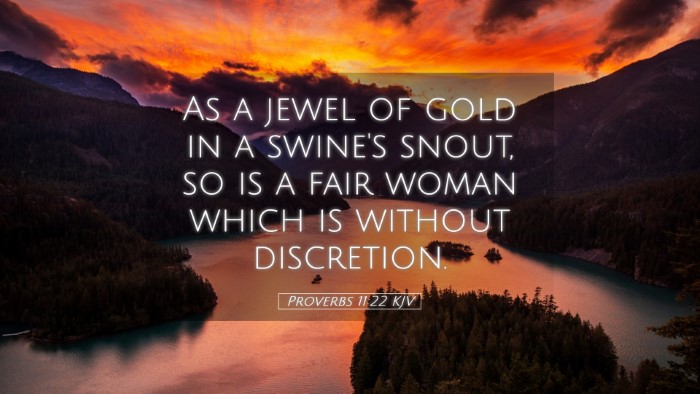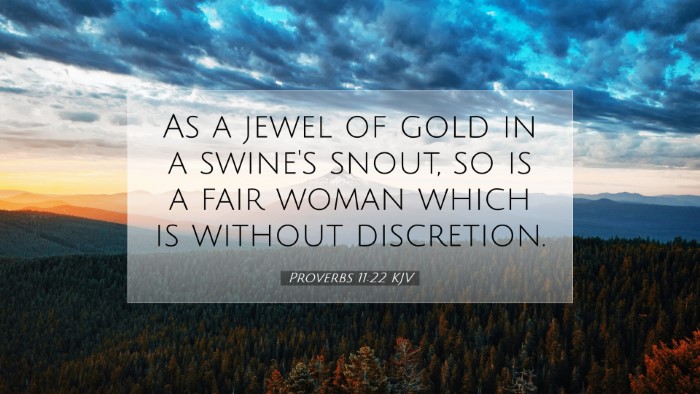Commentary on Proverbs 11:22
Proverbs 11:22 states: "As a jewel of gold in a swine's snout, so is a fair woman which is without discretion."
This verse presents a vivid metaphor comparing a beautiful woman without discretion to a gold ring in the snout of a pig. The imagery is stark and encourages deep reflection on the value of character and discretion over mere outward beauty.
Interpretative Insights
Several esteemed commentators offer insights into this verse that provide clarity and depth, emphasizing the characteristics of wisdom and discernment.
-
Matthew Henry:
In his commentary, Matthew Henry emphasizes that the worth of a woman (or any individual) is not determined solely by external beauty. He asserts that a lack of discretion, which includes wisdom, judgment, and moral integrity, can render outward beauty as worthless as a valuable object in a filthy place. He writes, "Beauty without modesty and without virtue is only a bait to ruin." In essence, Henry underscores that discretion—defined as the ability to make responsible decisions—is an essential quality, transforming appearance into something honorable.
-
Albert Barnes:
Albert Barnes notes that the metaphor effectively illustrates the incongruity of beauty and foolishness. He remarks that "a fair woman who has no sense" is a paradox that reflects poorly on both beauty and wisdom. Barnes highlights how wisdom and discretion bring value and honor, suggesting that misplaced beauty can lead to moral failings and societal misjudgment. He encourages readers to cultivate inner beauty, aligning one's spiritual essence with outward appearance.
-
Adam Clarke:
Adam Clarke expands on the notion of discretion, which he defines as a combination of sound judgment, purity, and moral goodness. Clarke elucidates that true beauty is augmented by virtues such as modesty, integrity, and a sound mind. In his examination, Clarke calls attention to the inherent value of character over mere aesthetics, cautioning that external allure can distract from one's character flaws. He contemplates the implications of such disparities, posing that a stunning facade without substance is ultimately detrimental.
Theological Reflections
The theological implications of Proverbs 11:22 extend beyond moral admonitions about personal conduct. The text serves as a profound commentary on the nature of God’s creation. Beautiful creations—humans being inherently called to reflect the imago Dei (image of God)—are expected to pair their outward appearance with godly attributes.
-
God’s Perspective on Worth:
This verse challenges and prompts believers to reflect on how God perceives worth. In the New Testament, 1 Samuel 16:7 echoes this sentiment: "For the Lord sees not as man sees: man looks on the outward appearance, but the Lord looks on the heart." Herein lies a foundation for understanding that true beauty, as God adores it, is deeply rooted in the heart.
-
Moral Instruction:
The passage offers moral instruction not only for women but also for men, who are called to value wisdom and discretion in their own lives and within their relationships. This encourages spiritual and moral integrity across all gender lines, promoting growth in character that harmonizes with God’s design.
Practical Applications
The practical applications of this verse are far-reaching, especially for pastors, students, theologians, and scholars seeking to lead lives that uphold biblical wisdom. Here are a few actionable insights drawn from the commentary:
-
Cultivate Inner Virtue:
Focus on cultivating qualities such as humility, integrity, and discretion in both personal and communal settings. Prioritize character development over superficial appearances.
-
Discernment in Relationships:
Emphasize the importance of aligning relationships with those who exhibit wisdom and discretion. Evaluate partnerships—both romantic and platonic—on the basis of character rather than mere appearance.
-
Mentorship Opportunities:
Encourage discussions and mentorship opportunities aimed at fostering discretion among younger generations. Highlight the significance of wisdom in decision-making processes, particularly in a media-driven society obsessed with image.
-
Focus on Holistic Beauty:
Encourage communities to embrace a holistic view of beauty that integrates body, mind, and spirit. This can reshape perceptions and promote discussions surrounding self-worth beyond societal standards.
Conclusion
Proverbs 11:22 serves as a potent reminder of the interplay between outward appearances and inner character. As elaborated by respected scholars and commentators, true worth is defined not by what is visible but by the virtues that dwell within. The ongoing reflection on this verse has profound implications for individual conduct, society’s values, and communal integrity. The exhortation to pursue discretion and wisdom falls not only upon individuals but also the collective body of believers, aspiring towards a life that pleases God and reflects His glory.


